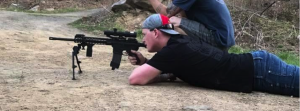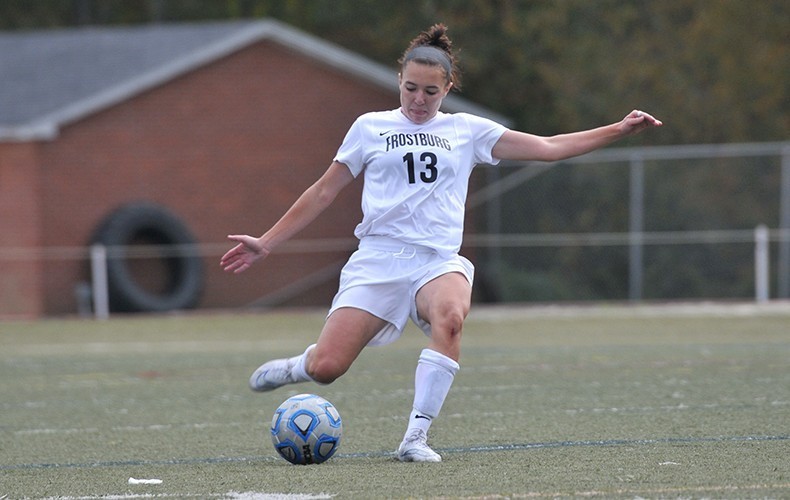Understanding Gun Laws On FSU’s Campus
(Ben Cockroft pictured with his AR15).
The battle between those who desire stricter gun control on-campus and those who feel that their Second Amendment rights are being threatened has become a heated one. Across the United States, different states have different laws concerning guns. However, they all share a common purpose: striving to make college campuses safer zones for faculty and students alike. Although more than two hundred college campuses allow for concealed gun carrying on campus, the majority of colleges oppose the idea. Some polls even suggest that 62% of the American public is against gun carrying on campuses. Although, the restriction of firearms may appear to be a beneficial thing, the recent mass shootings that have occurred on campuses have incited many individuals to desire to reinstate their right as an American citizen. Certainly, there are no easy answer to this hard pressed issue. At Frostburg State University, a small school located in Western Maryland, two students investigated gun laws on their campus and how a new bill that may pass in the Senate could affect Maryland universities in general.
In an effort to raise awareness on campus safety, Mary Jordy, a senior at Frostburg State, and Deborah Forde, a junior foreign exchange student, decided to shed light on the gun control policies and procedures in place specifically at FSU. Jordy spoke with Lieutenant John C. Ralston, Jr. in order to learn more about the policies in place at FSU. Upon arriving to the campus police building, she was buzzed in by a recognition alarm. Lt. Ralston answered questions thoroughly and adequately and provided some “good-to-know” answers.
Lt. Ralston explained that there are no guns allowed on campus, period. However, the campus police station can be a holding place for firearms, should a student live on campus and which to possess one. A student who possesses a firearm is given a registration card to demonstrate that they are the legal owner of that gun. When the student comes to pick it up, they must show their student I.D. and their registration card to the officer on duty. This is a service which is used by many students across campus.
The holding facility is not just for guns–other weapons, such as bows and knives are also held. Most people do not realize that three to four inch knives are not permissible to have on campus.
Lt. Ralston stated, “I do not think it [the holding facility] really makes a difference as far as decreasing crime. Most of the people that utilize the program are your average hunter and they use it to go hunting or what not. The people that want to use their gun for a different matter will find ways to do it. Many people also do not know about our holding place for weapons. In fact, I believe we may be the only school on the east coast that implements it.” In relation to the consequences for students who choose to not follow the legal procedures for their weapons, he stated, “There have been some situations in the past, but not that often. Students usually are not arrested for carrying a weapon on-campus. Instead, they are sent to referral, which is a judicial board and the administration decides what their punishment is. Usually, they are given sanctions.” The school will decided what the sanctions are depending on the situation.
When speaking of Delegate Barnes push to get a state law passed making prohibition of guns on campus, Lt. Ralston said he was initially excited about the idea but then realized that the liability for the campus police force will probably become much greater. “In any law, there are always some complications and some rules for which the law does not apply. It is going to be difficult to see how this law pans out. For instance, we have one main road through campus. Lots of locals travel that road and they might be traveling with a gun they brought from another state. However, if they are stopped for whatever reason, their weapon may be confiscated from them because they are on college property. What do you do in that case? These are tough questions to consider. With a different law in place, it is hard to see what will happen.” Jordy also inquired as to the possibility of gun safety courses being offered in college and even in high school. Ralston replied, “I do not think gun safety courses should be required, but I do think more courses should be offered.” These are all questions we as American college students should understand and learn more about it. Understanding how big the gun issue is in this country is the first step in trying to prevent more gun violence on campus without stepping on the personal freedom of the Second Amendment.
Deborah Forde interviewed Frostburg State atudent Ben Cockroft to get a student’a perspective on how efficient the campus police firearms policy is. Cockroft is an on-campus resident, and he currently has four firearms checked into the FSU police station, which include an AR15, AR10, Mini-14 and a Bolt action rifle. Cockroft enjoys going to shooting ranges in his spare time. He describes the procedure that he must go through in order to sign out his weapons: “First, one must walk into the lobby and request to be let in around the back through a set of locked doors. Before those doors are open, a criminal behavior check is done to make sure the user isn’t breaking any laws. After an officer has let you in the back, they verify your ID with the one on-file for the weapon. Checking the serial number of the weapon, and finally releasing the weapon to its owner.” Cockroft feels that the service provided for the holding of weapons is good because it allows students who live on-campus to continue to follow sports which involve firearms. However, it is tedious trying to get guns back out. Cockroft admits that signing out firearms could be done in a timelier manner, yet he also mentions that the system in the police station is new, so hopefully the speed of the system will improve with time. Cockroft then goes on to mention the fact that he has never had an issue with campus police, and overall he is happy with the service. He agrees with the weapons being held at the campus police station for student safety as this is the best option for mass firearm storage. In relation to the passing of the bill proposed by Delegate Barnes, Cockroft states that, “This bill is an issue for FSU students as the quickest way out of the Frostburg area is through I-68 and University Drive, which cuts straight through campus. This means that if I am pulled over for whatever reason between acquiring my firearms and leaving campus, I will go to jail, even if the weapons are secured and unloaded. I find that to be irrational and unnecessary.”
Via email, Jordy was allowed to discuss with Delegate Barnes his plan to get a bill passed through the state to make it a state law to not carry guns on campus, rather than just a campus law. Barnes stated,
“Thank you for contacting my office regarding House Bill 159, Weapons Free Higher Education Zones, Although the bill has not passed the Senate, this legislation is designed to codify the existing policy and will then apply the existing criminal penalties to any violation. The institution must post signs to provide notice of the bill’s prohibition in prominent locations on the property of the institution including all exits and entrances to the property. The bill also requires the University System of Maryland to incorporate into their bylaws, policies and procedures. This will make it against the law to carry a firearm on campuses rather than against policy. It is an extra precautionary measure to ensure the safety of all students.”
Although the gun controversy is far from over, perhaps laws such as this potential Maryland state law will enforce a stricter understanding of guns and allow for students to gain a better knowledge of the severity of possessing a firearm and the responsibility it carries. Certainly, the fact that universities such as Frostburg State aim to enlighten their students and faculty about the gun issue across American colleges shows that this knowledge could help other students learn more about campus gun laws and ways to keep their community safe.
Written by Mary Jordy and Deborah Forde




